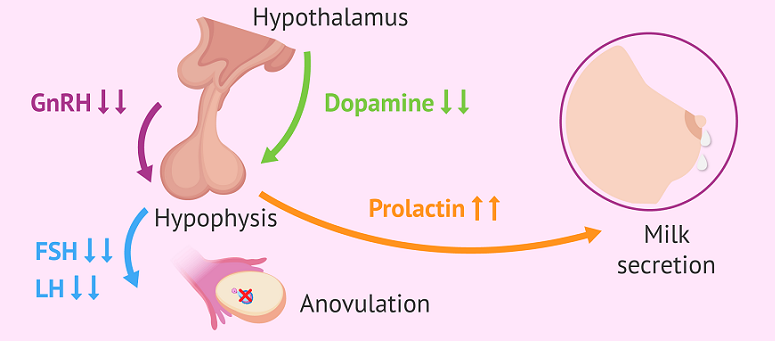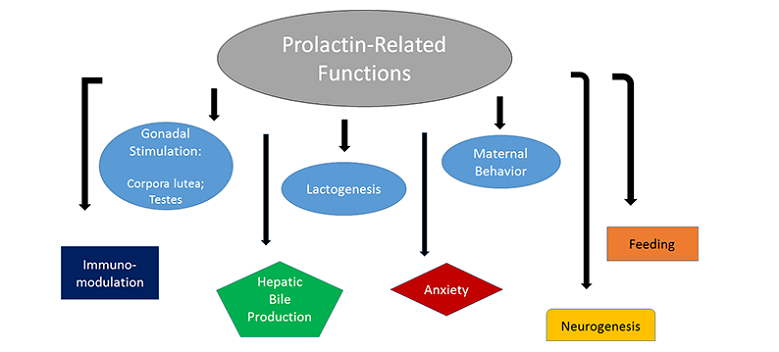
Prolactin, a hormone best known for its role in lactation, has a far-reaching impact on the human body. While it is well-established that prolactin plays a crucial role in reproductive functions, recent studies have begun to shed light on its lesser-known effects on the brain and cognition. Here we delve deeper into the complex relationship between prolactin and the brain, exploring its influence on neurotransmitters, neurogenesis, stress response, sleep, and sex differences in cognitive function.
Contents
Prolactin: A Brief Overview
Prolactin is a peptide hormone primarily produced and secreted by the anterior pituitary gland. It belongs to the same family of hormones as growth hormone and placental lactogen. Its most well-known function is the stimulation of milk production (lactation) in females after childbirth. However, it also plays a role in numerous other physiological processes, including immune system regulation, metabolism, and reproductive functions.
Synthesis and Secretion
Prolactin synthesis occurs in specialized cells called lactotrophs found in the anterior pituitary gland [1]. The secretion of prolactin is regulated by a complex interplay of factors, such as the hypothalamus, neurotransmitters, and hormones. The primary regulator of prolactin secretion is dopamine, which inhibits its release. Other factors, such as thyrotropin-releasing hormone (TRH), estrogen, and stress, can stimulate prolactin secretion.
Role in Lactation
During pregnancy, the levels of prolactin in the body gradually increase, preparing the mammary glands for milk production. After childbirth, the sudden drop in progesterone levels prompts a surge in prolactin, initiating lactation. Prolactin stimulates the mammary glands to produce milk and plays a vital role in maintaining milk supply throughout the breastfeeding period. The act of nursing triggers further prolactin release through a feedback loop, ensuring a continuous milk supply for the infant.

Prolactin’s Impact on Neurotransmitters and the Brain
While prolactin is commonly associated with lactation, its influence extends beyond the realm of reproductive functions. This hormone also interacts with various neurotransmitters that play key roles in mood regulation, cognition, and social behavior.
Dopamine
Dopamine is a neurotransmitter that plays a crucial role in modulating mood, motivation, and reward. It is also the primary inhibitor of prolactin secretion [2]. The release of dopamine from the hypothalamus into the pituitary portal system inhibits prolactin synthesis and secretion by binding to dopamine D2 receptors on lactotrophs. This intricate relationship between dopamine and prolactin ensures that prolactin levels remain balanced, thus maintaining proper physiological functioning.
Prolactin’s influence on dopamine can also impact mood and cognition. An imbalance in the dopamine-prolactin relationship may contribute to mood disorders such as depression or even cognitive impairments. For example, increased prolactin levels can lead to reduced dopamine activity, which may result in symptoms like anhedonia (loss of pleasure), decreased motivation, and cognitive deficits.
Serotonin
Serotonin is another neurotransmitter that plays a vital role in mood regulation, sleep, appetite, and other essential functions. Studies have found that serotonin can stimulate prolactin release by acting on specific receptors in the hypothalamus [3]. Conversely, certain serotonin receptor antagonists have been shown to suppress prolactin secretion, highlighting the complex interplay between these two molecules.
The relationship between prolactin and serotonin has implications for mood and cognition as well. Since serotonin is a key regulator of mood, an imbalance in the serotonin-prolactin interaction can contribute to mood disturbances and cognitive dysfunction. Further research is needed to better understand the implications of this relationship for mental health and cognition.
Oxytocin
Oxytocin, often referred to as the “love hormone,” is known for its role in social bonding, trust, and stress reduction. It is synthesized in the hypothalamus and secreted by the posterior pituitary gland. Studies have shown that oxytocin can stimulate prolactin release, suggesting a connection between these two hormones [4].
The interplay between prolactin and oxytocin may have implications for social behavior and stress response. Elevated prolactin levels, driven by increased oxytocin, could potentially enhance social bonding and improve stress resilience. However, more research is needed to fully understand the extent of this relationship and its impact on human behavior and mental health.

Prolactin’s Role in Neurogenesis and Brain Plasticity
The influence of prolactin extends beyond its interactions with neurotransmitters, as it also plays a crucial role in shaping the brain’s structure and function.
Effects on Adult Neurogenesis
Neurogenesis, the process of generating new neurons, occurs throughout life, particularly in specific regions like the hippocampus, which is crucial for learning and memory. Recent research has demonstrated that prolactin can promote adult neurogenesis, influencing the production of new neurons and their integration into existing neural circuits [5]. Prolactin has been shown to directly stimulate neural stem cells, promoting their proliferation and differentiation into mature neurons.
Impact on Hippocampus and Memory
The hippocampus, a region associated with learning and memory, is particularly sensitive to the effects of prolactin on neurogenesis. Studies have found that increased prolactin levels can enhance hippocampal neurogenesis, leading to improved learning and memory performance in animal models [6]. This suggests that prolactin may play a crucial role in modulating cognitive functions, particularly those related to memory processing.
Influence on Neuronal Differentiation and Survival
In addition to promoting neurogenesis, prolactin also influences the differentiation and survival of neurons [7]. Research has shown that prolactin can affect the development of specific neuronal subtypes, such as dopaminergic and GABAergic neurons, which are essential for maintaining the balance of excitatory and inhibitory signaling in the brain. Furthermore, prolactin has been found to have neuroprotective effects, helping to maintain neuronal survival in the face of injury or degeneration.
Prolactin and Stress
Stress is an unavoidable part of life, and understanding the underlying mechanisms that govern our response to stress is essential for maintaining mental health and well-being.
Prolactin’s Role in the Stress Response
Stress is a complex physiological and psychological response to challenging or threatening situations. Prolactin plays a significant role in modulating the stress response through its interactions with other hormones and neurotransmitters [8]. Stress can trigger the release of prolactin, which in turn can impact the hypothalamic-pituitary-adrenal (HPA) axis, a critical neuroendocrine system involved in stress regulation.
Effects on Stress Resilience and Coping
Prolactin’s influence on stress response has implications for stress resilience and coping strategies. Studies have found that increased prolactin levels can enhance stress resilience in animal models by promoting adaptive coping behaviors, such as active problem-solving and social support-seeking. These findings suggest that prolactin may play a role in buffering the adverse effects of stress on mental health and well-being.
Influence on the Hypothalamic-pituitary-adrenal (HPA) Axis
The HPA axis is a central component of the body’s stress response system, responsible for the release of cortisol and other stress hormones. Prolactin can modulate the activity of the HPA axis both directly and indirectly [9]. For example, prolactin can inhibit the secretion of corticotropin-releasing hormone (CRH), a key regulator of the HPA axis. Additionally, through its interactions with other neurotransmitters, such as dopamine and serotonin, prolactin can further influence HPA axis functioning.

Prolactin, Sleep, and Cognition
The importance of sleep for maintaining optimal cognitive function is well-established, and the complex hormonal regulation of sleep remains a topic of ongoing research.
Relationship Between Prolactin and Sleep Regulation
Sleep is essential for overall health and well-being, and its regulation involves a complex interplay of hormones and neurotransmitters. Prolactin has been found to play a role in sleep regulation, with levels showing a circadian rhythm that peaks during sleep, particularly during periods of rapid eye movement (REM) sleep [10]. The exact mechanisms through which prolactin influences sleep remain unclear, but it is thought to interact with other sleep-regulating neurotransmitters, such as melatonin and GABA.
Impact on Sleep Quality
Research has shown that alterations in prolactin levels can impact sleep quality. For example, elevated prolactin levels have been associated with increased sleep fragmentation and a reduction in REM sleep duration. Conversely, decreased prolactin levels have been linked to improvements in sleep quality and increased REM sleep. These findings suggest that prolactin may play a role in maintaining sleep quality and ensuring proper sleep architecture.
Influence on Cognitive Performance and Memory Consolidation
Sleep is crucial for cognitive performance and memory consolidation, processes that allow us to learn and retain information effectively. Given prolactin’s role in sleep regulation and its influence on neurogenesis, it is likely that this hormone also affects cognitive performance and memory consolidation. Studies have found that disruptions in sleep due to altered prolactin levels can lead to impairments in cognitive performance and memory consolidation [11]. However, further research is needed to fully understand the extent of prolactin’s impact on these cognitive processes.
Sex Differences in Prolactin’s Effects on the Brain
The influence of prolactin on the brain and cognition may differ between males and females due to variations in hormonal regulation.
Hormonal Differences Between Males and Females
While both males and females produce prolactin, there are significant differences in hormonal profiles and baseline prolactin levels between the sexes [12]. Females generally exhibit higher prolactin levels due to the influence of estrogen, which stimulates prolactin secretion. Additionally, during pregnancy and lactation, females experience dramatic increases in prolactin levels. These hormonal differences may contribute to sex-specific effects of prolactin on brain function and cognition.
Cognitive Differences Related to Prolactin
Emerging research has begun to investigate the potential sex differences in prolactin’s effects on cognition. Some studies have found that females with higher prolactin levels may exhibit better verbal memory performance, while males with elevated prolactin levels might show impairments in spatial memory tasks. However, these findings are still preliminary and further research is needed to confirm and expand upon these observations.
Sex-specific Effects on Stress Response
Prolactin’s role in modulating the stress response may also differ between males and females. Studies have suggested that elevated prolactin levels may enhance stress resilience in females by promoting adaptive coping behaviors, while in males, high prolactin levels might be associated with increased vulnerability to stress. These sex-specific effects could have important implications for understanding and treating stress-related disorders in both men and women.
Potential Implications for Mental Health
Sex differences in prolactin’s effects on the brain may have implications for the prevalence, presentation, and treatment of mental health disorders. For example, understanding the sex-specific impact of prolactin on neurotransmitters, neurogenesis, and stress response could help explain differences in the prevalence of mood disorders between males and females, and inform the development of targeted therapeutic interventions.
References
[1] Prolactin: Structure, Function, and Regulation of Secretion
[2] Dopamine as a Prolactin (PRL) Inhibitor
[3] The Hypothalamic-Pituitary-Adrenal Axis: Development, Programming Actions of Hormones, and Maternal-Fetal Interactions
[4] Oxytocin: An emerging regulator of prolactin secretion
[5] Reproduction: A New Venue for Studying Function of Adult Neurogenesis?
[6] Increase in serum prolactin levels in females improves the performance of spatial learning by promoting changes in the circuital dynamics of the hippocampus
[7] The Neuroprotective Power of Progesterone
[8] Actions of Prolactin in the Brain: From Physiological Adaptations to Stress and Neurogenesis to Psychopathology
[9] Adaptive Modifications of Maternal Hypothalamic-Pituitary-Adrenal Axis Activity during Lactation
[10] Rapid Eye Movement Sleep Is Reduced in Prolactin-Deficient Mice
[11] Interactions between Sleep and Emotions in Humans and Animal Models
[12] Identification of an optimal prolactin threshold to determine prolactinoma size

